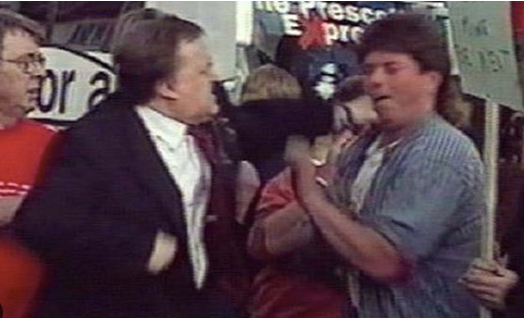
The former deputy PM of Britain passed away battling with Alzheimer’s on Tuesday, his family announced. The labour firebrand, who had a pivotal role in the figure in Sir Tony Blair’s New Labour Project, took his last breaths peacefully in a care home surrounded by family.
The deceased served as Deputy Prime Minister under Tony Blair from 1997 to 2007. Prescott’s sole career goal revolved around social justice, workers’ rights, and bridging the gap between the Labour Party’s old guard and its rejuvenating forces under Blair’s leadership.
His legacy spans over five decades of political service as he has served in transformative roles of governance, policy-making, and grassroots activism.
Early Life and Emergence into Politics
His background was quite humble: born on May 31, 1938, in Prestatyn, Wales, the son of a railway signalman, Prescott left school at 15 and went on to work as a steward in the Merchant Navy before turning to education at Ruskin College, Oxford, and the University of Hull. He was aware firsthand of the struggles of working-class people, and it gave him a role in representing the marginalized.
Prescott entered Parliament in 1970 as the Labour MP for Hull East, a seat he held for 37 years. His career in opposition saw him champion traditional Labour values, especially during the party’s wilderness years under Neil Kinnock’s leadership. By 1994, he became Deputy Leader of the Labour Party, positioning himself as a crucial bridge between the trade unions and Blair’s centrist “New Labour” vision.
The Labor Firebrand
When the candidate was running for governor in 2001, he made the news for punching a guy. The scuffle occurred during the campaign when words between two people turned into a fight. That person had allegedly either insulted the candidate or had provoked him which made him lash out. The media covered the incident and its storm captured the public’s imagination and controversies followed. Although the candidate later apologized for the incident, it became the hallmark of that election, and people started questioning his character and leadership capabilities. As the election campaign wore on, the punch became more and more central to the political debate and shaped the way people viewed the candidate.

The Blair Years and Deputy Premiership
Prescott played an important role in the landslide victory of Labour in 1997. As Deputy Prime Minister, he headed the newly-created Department of Environment, Transport, and the Regions. Major infrastructure and programs for the restructuring of urban areas and the environment were under his influence. During his time, the integrated transport strategy was introduced and his support for regional devolution, as witnessed by the establishment of the Welsh Assembly and the Scottish Parliament.
Despite his successes, Prescott’s career was not without controversy. His fiery temperament and unfiltered remarks earned him both criticism and admiration. Famously, he responded to an egg-throwing protester in 2001 with a punch, earning him the nickname “Two Jabs.” Nevertheless, this incident, much like his career, highlighted his authentic connection to his working-class roots.
Challenges and Controversies
Two major storms crossed his path: the discovery of an extra-marital affair in 2006. During his lifetime, his private life sometimes overshadowed his political contributions, as he publicly apologized and maintained his seat until Blair’s departure in 2007. His ability to ride those storms demonstrated his resilience and commitment towards public service.
Later Years and Legacy
He stepped down from Parliament in 2010 and was elevated to the House of Lords by appointment as Baron Prescott of Kingston upon Hull. He continued to promote climate action, social equality, and regional development. Prescott had publicly championed Jeremy Corbyn, but health problems, including a stroke in 2019, had reduced his visibility in public Labour life.
The death of Prescott places an end to an era for the Labour Party and British politics. His life’s work typifies the Labour movement’s relentless struggle for fairness and opportunity. From his impassioned speeches from the despatch box to grassroots campaigning, Prescott’s political career stands as a testament to believing that politics can indeed lead to changeable reality.
A Reflection on Contributions
John Prescott contributed in a wide range of critical areas:
Labour Reforms: Prescott made the party an intermediary between the union legacy of Old Labour and the modernizing ambitions of New Labour. He made the party appeal to a wide cross-section of voters.
Infrastructure and Environment: He spearheaded the ideas of green transport and sustainable city building, which have now shaped the infrastructure of Britain.
Social Equity: Prescott pushed for workers’ rights, fair wages, and regional representation, thus improving lives.
As Britain reflects on Lord Prescott, his legacy serves as a reminder of the importance of steadfast commitment to principle in public life. From the shipyards of the Merchant Navy to the highest echelons of government, his journey inspired generations to engage in politics with authenticity and purpose.
His work will be, as it were, a milestone in modern British Labour history; his memory will live long through the policies and values he advocated.

